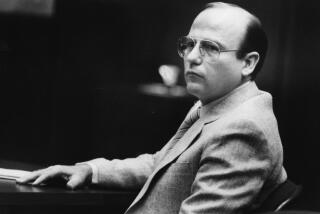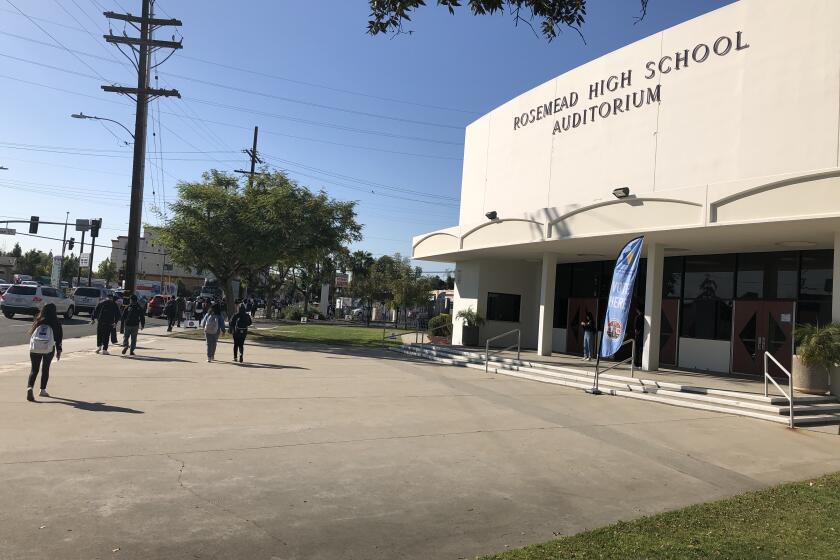A mayor for the schools
The PEOPLE OF LOS ANGELES look to their mayor for leadership in fixing their public schools. No theme was more prevalent during the recent campaign, and it was a theme embraced by voters and candidates alike. The new mayor of Los Angeles boldly proposed taking over the local schools, and then skittered away from the idea. Once broached, though, the topic would not go away. Several other big cities -- New York, Boston, Chicago -- have handed control of their ailing schools to their mayors, and the results have generally been good. The time has come for Los Angeles to do the same.
State Sen. Gloria Romero (D-Los Angeles) is pressing the issue in Sacramento, even as Antonio Villaraigosa is still settling into office. Romero has introduced legislation that would empower the mayor to appoint the school superintendent and seven of the nine school board members. The bill isn’t likely to pass this year; it already faces opposition from big labor and Assemblywoman Jackie Goldberg (D-Los Angeles), who heads the Education Committee. They advise caution, pointing to local commissions studying the matter and the possibility that the district can improve itself. But “let’s wait and see” was not the prevalent theme of the recent campaign on the issue of the mayor’s role in education. It’s also not an acceptable answer to parents of children who have been attending a broken school district.
We understand that Villaraigosa does not want to overreach by seeming overly zealous or impatient to take over the school district. But he is in danger of going too far in the other direction -- in beating a hasty retreat from his campaign pledge to assume “ultimate control and oversight” of schools. On Monday, the mayor disappointingly applied the brakes, saying he wants to wait and see whether the Los Angeles Unified School District will heal itself. Enough waiting. Enough seeing.
The progress made in the Los Angeles schools -- a spate of higher test scores, faster school construction -- have been offset by larger failures. Schools with poor children still lack qualified teachers, with students in some key subjects taught throughout the year by substitute teachers. Barely more than half the district’s schools met their state test targets this year, a big drop from the previous year, and middle and high schools have been going nowhere. The dropout rate approaches 50% -- higher yet for Latino and black teenagers -- and parents are afraid to send their children to school, worried about their safety. Yet the school board dithers for hours about minutiae and puts off vital decisions about failing schools.
Mayoral control has a lot to offer L.A. schools. Most people already assume that mayors have a role in education, so this is a matter of aligning reality with perception -- of adjusting the mayor’s job description to suit the desires of his employer, the citizens of L.A. This would inject some sorely needed accountability into the public education system, diluting the power of the teachers union. Mayoral elections attract more voters; the turnout for the last L.A. school board election was about 10%. With the mayor in charge, everyone knows which office to call, and the school board moves in a more purposeful direction. Greater accountability would shine some daylight into the famously opaque school district budget, and a mayor can coordinate schools with other city departments.
The experiences of other places show that big-city mayors, with their higher public profile, can bring in new funding from private charities and public lobbying. They can’t blame “the other” board members or the superintendent because they appointed all or most of them.
Absorbing the school district is a daunting logistical challenge, but Villaraigosa can’t avoid it if he is to succeed as mayor. And a task this monumental is best undertaken at the outset of an administration, as Mayor Michael R. Bloomberg has shown in New York. Villaraigosa’s close ties to the teachers union will only make any efforts on his part to delay a takeover all the more suspect. His cool reaction to the Romero bill already provides opponents with a powerful line of attack: If the mayor doesn’t want this authority, why should we give it to him?
Romero’s proposal is a worthy opening salvo in Sacramento, though it isn’t perfect. The bill would phase in mayoral control over a long period, as it would honor the terms of current board members, and it may not make enough concessions to those communities that lie outside of the city of Los Angeles but within the school district.
These issues, and the lessons other cities have to offer on school governance, will be taken up in future editorials and should be taken up in legislative hearings in Sacramento. The details need to be worked out, but with a sense of urgency, as the underlying concept is unassailable. The people of Los Angeles want their mayor to assume control of their schools. No more excuses.
More to Read
Start your day right
Sign up for Essential California for news, features and recommendations from the L.A. Times and beyond in your inbox six days a week.
You may occasionally receive promotional content from the Los Angeles Times.






